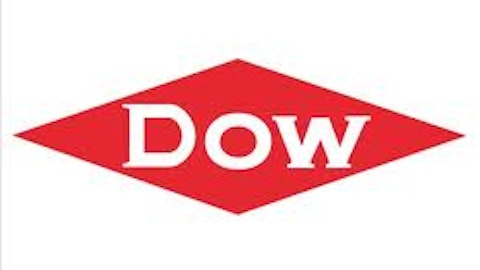Thanks to the Environmental Protection Agency, you can now eat more of Monsanto Company (NYSE:MON)‘s herbicide Roundup in your food.
Because there wasn’t anywhere near as much coverage as there was for President Obama signing into law the so-called “Monsanto Company (NYSE:MON) Protection Act” — which prohibits federal courts from halting the sale of genetically modified or engineered seeds — the decision by the regulatory agency to increase the acceptable level of pesticides permitted on food crops went through without much of a fight (though the EPA received nearly 11,000 public comments opposing the move).

Roundup remains the largest crop protection brand globally, and because it genetically modifies seeds to survive an application of the herbicide, Monsanto Company (NYSE:MON) has oriented the focus of its crop protection business to support Roundup Ready crops sold to farmers. Buy seeds that can withstand Roundup, sell more Roundup to spray on crops.
A byproduct of this symbiotic relationship, though, is the creation of superweeds, weeds that have developed a tolerance to the herbicide and are spreading across farmland, impervious to man and machine. Because farmers who grow GM crops typically use 25% more herbicide, not less, than those who grow traditional seeds, the weeds are developing a thirst for it.
Yet it’s not just weeds that are growing resistant. Bugs, too, have become immune to the chemicals. Monsanto Company (NYSE:MON)’s GM corn, for example, was molecularly modified to kill pests like rootworm, but they’re making a comeback even as GM corn accounts for 86% of the country’s supply. Now we’ve got superinsects, too!
Just as Monsanto Company (NYSE:MON) is enjoying a surge in sales of Roundup, pesticide makers are witnessing greater sales of pesticides to combat these superbugs. Revenues at Sygenta rose 1.5% to $4.2 billion, FMC Corp (NYSE:FMC)‘s sales were 5% higher, and American Vanguard Corp. (NYSE:AVD)‘s surged 39% last quarter. The three companies account for three-quarters of all ground pesticides sold in the United States.
The greater use of pesticides may also be harming the honeybee population, as a nexus is being formed between colony collapse disorder and the role of neonicotinoids made by Syngenta, Bayer, and The Dow Chemical Company (NYSE:DOW) play.
So having the EPA coming in and allowing our fruits and vegetables to contain even greater amounts of Roundup on them is a big cause for concern. The proposed rules would permit crops such as sesame, flax, and soybean to have twice as much glysophate levels than previously permitted, while sweet potatoes and carrots would see them climb by 15 times and 25 times the previously allowed levels, respectively.
While Monsanto Company (NYSE:MON), of course, says ingesting such amounts of its herbicides is safe, an MIT study published earlier this year found it causes “insidious” damage at the cellular level and leads to increased risk of gastrointestinal disorders, heart disease, autism, cancer, and Alzheimer’s disease.
Having to combat superweeds and superbugs requires a lot of herbicides and pesticides. After passage of the Monsanto Company (NYSE:MON)Protection Act, perhaps this ought to be called the Monsanto Growth Rule. The Roundup segment of the chemical giant’s business generates 30% of its revenues and 26% of its operating profits. When these regulations going into effect, we just might see more profits sprouting from there, like a genetically modified plant amid a Roundup-sprayed field.
The article A New Monsanto Growth Initiative Sprouts Up originally appeared on Fool.com.
Fool contributor Rich Duprey has no position in any stocks mentioned. The Motley Fool recommends Scotts Miracle-Gro.
Copyright © 1995 – 2013 The Motley Fool, LLC. All rights reserved. The Motley Fool has a disclosure policy.




